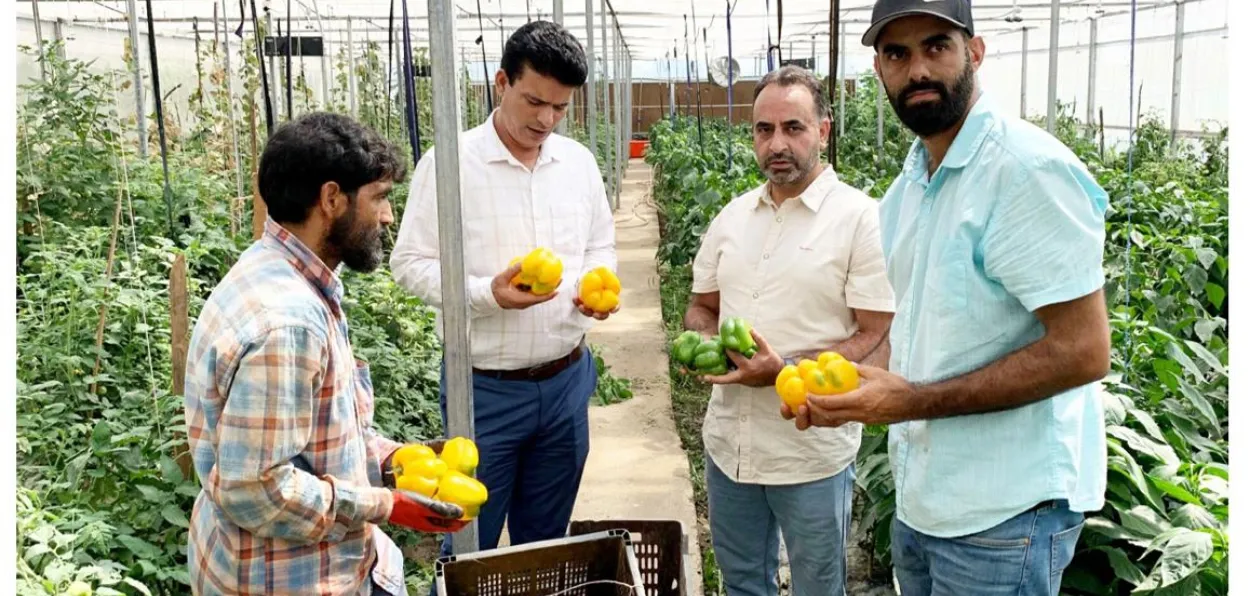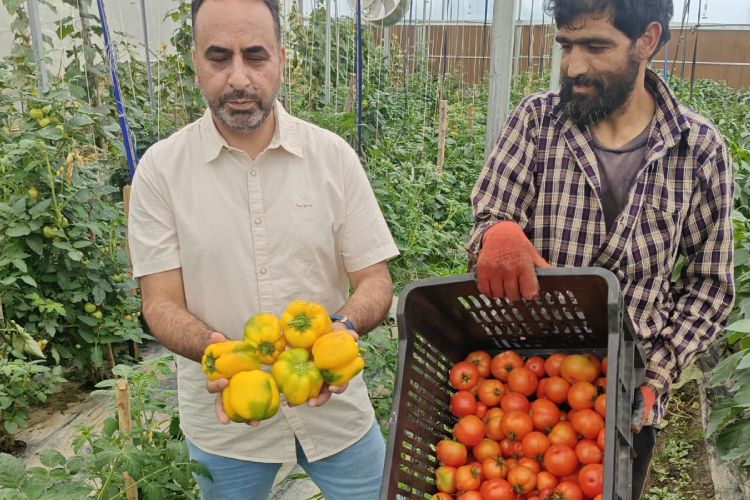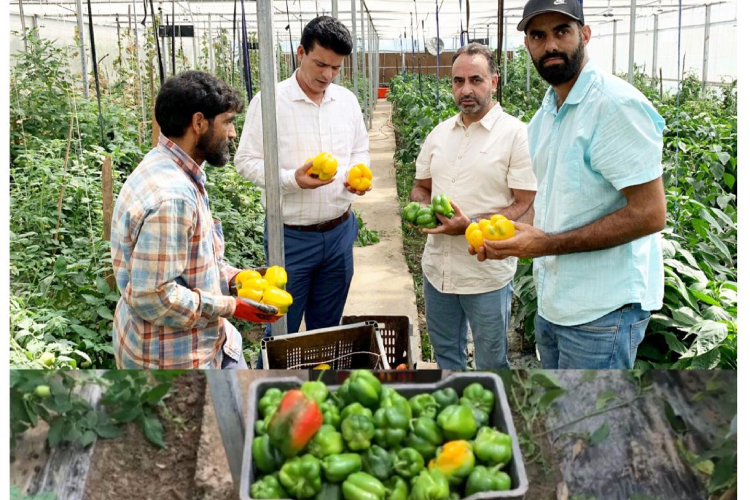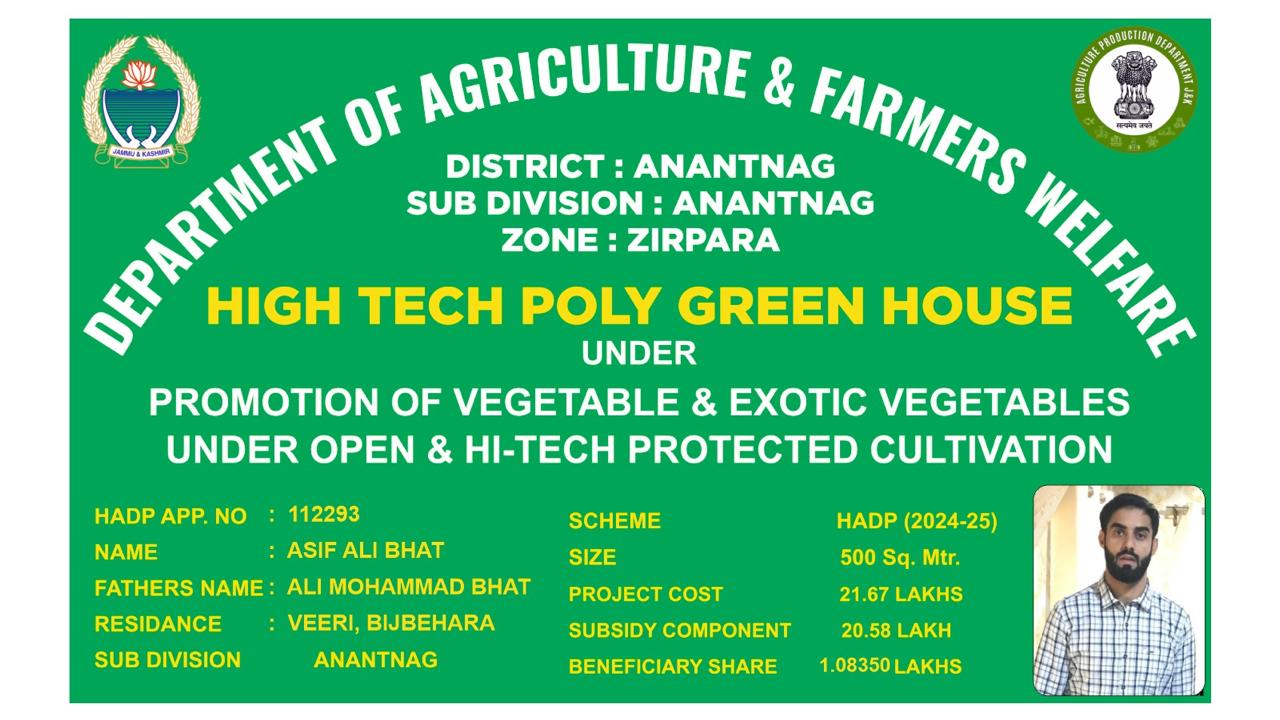
Ehsan Fazili/Srinagar
Asif Ali Bhat missed Kashmir while working as an electrical engineer in Qatar. One day, he quit his job and returned home with the dream of making it big. Two years later, he is a successful agricultural entrepreneur growing exotic vegetables in his high-tech Poly Green vegetable farm of 500 sq ft. area. His experimental farming idea has the backing of the J&K government’s scheme for enterprising farmers.
His farm yielded two tonnes of tomato, 1.5 tonnes of bell pepper, and 2.5 lakh seedlings of cucumber - all from a 500 sq feet area!
His next step is to use all 15 kanals (15 times more than his present farm) of family land in Veeri village, Bijbehara area of Anantnag district for growing food crops.
“We have a lot of (agricultural) land unused in Jammu and Kashmir, which can BE easily utilized to grow different varieties by adopting modern scientific technology”, Asif Ali Bhat told Awaz-The Voice.
 Dr. Syed Talib Hussain of J&K Agriculture Department with the freshly harvested crop at Asif Ali Bhat's farm
Dr. Syed Talib Hussain of J&K Agriculture Department with the freshly harvested crop at Asif Ali Bhat's farm
He thought of exploring agriculture as a livelihood in Kashmir during his two-year stay in Qatar WHERE HE SAW how very few vegetables were available in the markets, and most of these were imported from outside countries, including India.
“These vegetables are costly there, while mutton is cheaper”, he said, adding that this gave him an idea that vegetables could be grown on a large scale in the valley. His research led him to the Holistic Agriculture Development Programme of the J&K Government.
He spoke with experts, and he realized the scope of his idea. Asif Ali decided to go into vegetable cultivation, for which farmers are provided a 95 percent subsidy under the HADP scheme. Additionally, agricultural experts of the government also guide farmers.
His proposal was approved for Rs 20.58 lakh under the scheme in 2024. The first produce from his farm happened early this year.

Asif Ali Bhat (extreme right) with government officials at his farm
“We sold out about two lakh seedlings in two days,” early in March, he said. “These seedlings were ready in advance with the guidance of the experts from the Agriculture Department and available to the consumers much in advance as compared to the traditional growth, about a couple of months later”, Asif Ali commented.
Encouraged by the outcomes, Asif Ali plans to “make it an open crop” as not all a greenhouse.
“We will also expand it to cover all the 15 kanals of land”, he said. The crops include bell pepper, tomato, seedless cucumber, broccoli, other local produce, and exotic vegetables.
Asif Ali Bhat has an M. Tech degree in Electrical Engineering from Kurukshetra University. Earlier, he worked in a Government Polytechnic college, Srinagar, and as an Assistant Professor in the Islamic University of Science and Technology (IUST), Awantipora.
He left for Qatar in 2017 for a lucrative job. However, the nature of working abroad and the circumstances that nurtured the idea of farming back home by adopting technological ways brought the young man back to Kashmir after a couple of years.

A hoarding of the Agriculture Department
“Unemployed youth in any field can benefit from different schemes under HADP as these offer 50 to 95 percent subsidy,” said Dr Syed Talib Hussain, Agriculture officer in Anantnag. He said Asif Ali presented his plan for Rs 21.68 lakhs in 2023; it was approved in 2024. He was offered financial support of Rs 20.58 lakhs.
“We have also been guiding him”, he said. This is the reason Asif planted four lakh seedlings of different vegetables during the off-season between January and March. As farmers in Kashmir can not grow crops in this season due to snowfall and low temperatures, seedlings from Asif's farm were available in advance.
ALSO READ: 10 Muslim personalities who shaped Indian film industry
He said that seedlings of tomato, brinjal, etc., which are normally ready by June-July, were made available by April. He added that demand for exotic vegetables mainly comes from the hotel industry, and it's growing.
